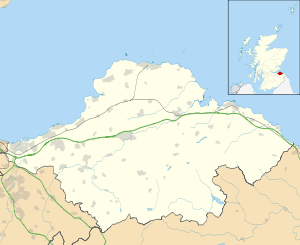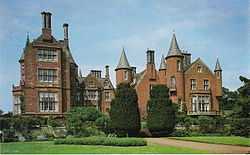Tyninghame House
| Tyninghame House | |
|---|---|
|
Tyninghame House | |
| Coordinates | 56°00′36″N 2°36′44″W / 56.0099°N 2.6121°WCoordinates: 56°00′36″N 2°36′44″W / 56.0099°N 2.6121°W |
Listed Building – Category A | |
| Designated | 5 February 1971 |
| Reference no. | 14586 |
| Designated | 1987 |
 Location of Tyninghame House in East Lothian | |
Tyninghame House is a mansion in East Lothian, Scotland. It is located by the mouth of the River Tyne, 1 kilometre (0.62 mi) east of Tyninghame and 6 kilometres (3.7 mi) west of Dunbar. There was a manor at Tyninghame in 1094, and it was later a property of the Lauder of The Bass family. In the 17th century it was sold to the Earl of Haddington. The present building dates from 1829 when the 9th Earl of Haddington employed William Burn to greatly enlarge the house in the Baronial style. In 1987 the contents of the house were sold, and the house was divided into flats.
The house is protected as a category A listed building,[1] and the grounds are included in the Inventory of Gardens and Designed Landscapes in Scotland, the national listing of significant gardens.[2]
History
There was a manor on the lands in 1094, when it was mentioned in a charter of Duncan II of Scotland to the monks of St Cuthberts.[3] From 1250 into the 16th century Tyninghame was held by the Bishops of St Andrews. It was leased to the Lauder family as a winter residence. The Lauders owned The Bass, and lived there in the summer.[3] In 1617 the Dowager Lady Bass, Isabella Hepburn (widow of George Lauder of The Bass (d.1611)) made additions to the house.[4]
Earls of Haddington
In 1628 when Thomas Hamilton, 1st Earl of Haddington received that title in exchange for that of Earl of Melrose he acquired Tyninghame by purchase.[3] His son was killed in an explosion at Dunglass Castle in 1640, and by 1669 the 5th Earl had inherited the property. He married Margaret Leslie, 8th Countess of Rothes, daughter of the Duke of Rothes, and lived mainly on his wife's estate.[5] His son, the 6th Earl, took up residence at Tyninghame following his marriage around 1700. He found the estate in poor condition, and set about renovating and replanting. He is largely responsible for the layout of the parks which survives today, including avenues, plantations, and the 400 acres (160 ha) Binning Wood. A noted agricultural improver, the Earl wrote a book, A Treatise on the Manner of Raising Forest Trees, published in 1761.[5]
In 1791 Charles, the 8th Earl, renovated the house,[4] but these were superseded by the works carried out by the 9th Earl. In 1828 he commissioned William Burn to redesign the house in the Scots Baronial style. Burn made only limited alterations to the plan of the house, but totally altered the elevations, refacing most of the building in red sandstone, and adding turrets and other details.[3] The original 17th-century masonry can be seen on the south facade.[1] The 9th Earl also carried out further plantings in the parks, and erected an obelisk in 1856 to commemorate the work of the 5th Earl.[5]
On the death of the 9th Earl in 1858, the estate was inherited by a cousin, George Baillie of Mellerstain. His son, the 11th Earl carried out further plantings in the 1880s, including the Walled Gardens. Formal gardens, including Lady Haddington's Secret Garden, were established by the 12th Earl and his wife in the 20th century.[5] The house was featured in Country Life on 7 August 1975, and in Scottish Field in August 1953. After the 12th Earl died in 1986, the 13th Earl chose to retain Mellerstain House near Duns as his main residence, and Tyninghame was sold the following year. The bulk of the contents were auctioned by Sotheby's in a two-day sale at the house, on 28–29 September 1987.[6] The house was then divided into apartments by country house developer Kit Martin.
References
- ↑ 1.0 1.1 "Tyninghame House: Listed Building Report". Historic Scotland. Retrieved 16 November 2011.
- ↑ "Tyninghame". Inventory of Gardens and Designed Landscapes in Scotland. Historic Scotland. Retrieved 16 November 2011.
- ↑ 3.0 3.1 3.2 3.3 "Tyninghame House". CANMORE. Royal Commission on the Ancient and Historical Monuments of Scotland. Retrieved 16 November 2011.
- ↑ 4.0 4.1 Hannan, p.182
- ↑ 5.0 5.1 5.2 5.3 "Tyninghame: Site History". Inventory of Gardens and Designed Landscapes in Scotland. Historic Scotland. Retrieved 16 November 2011.
- ↑ Catalogue for the sale of the contents of Tyninghame, East Lothian, Scotland. London: Sotheby's. 1987.
- Hannan, Thomas (1928). Famous Scottish Houses. London.
External links
-
 Media related to Tyninghame House at Wikimedia Commons
Media related to Tyninghame House at Wikimedia Commons
